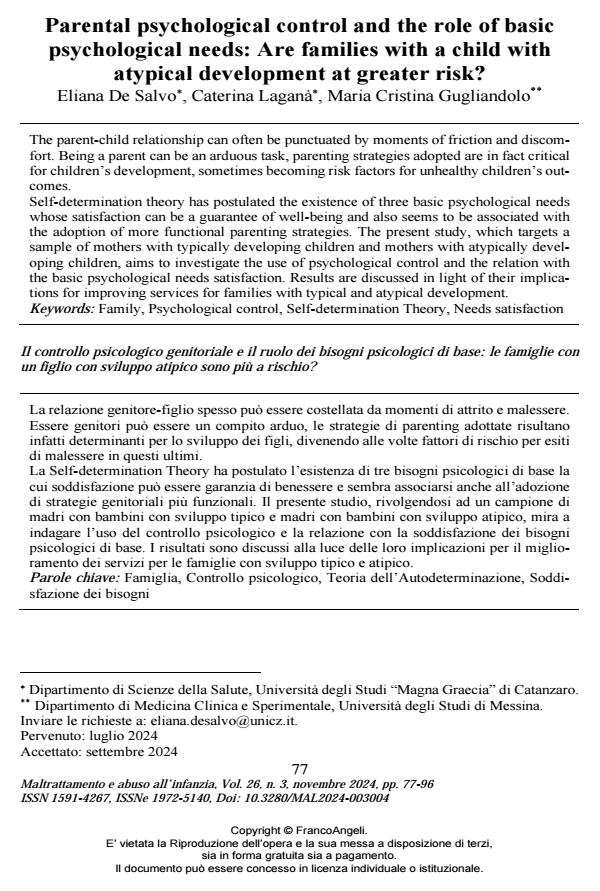Parental psychological control and the role of basic psychological needs: Are families with a child with atypical development at greater risk?
Titolo Rivista MALTRATTAMENTO E ABUSO ALL’INFANZIA
Autori/Curatori Eliana De Salvo, Caterina Laganà, Maria Cristina Gugliandolo
Anno di pubblicazione 2024 Fascicolo 2024/3
Lingua Inglese Numero pagine 20 P. 77-96 Dimensione file 198 KB
DOI 10.3280/MAL2024-003004
Il DOI è il codice a barre della proprietà intellettuale: per saperne di più
clicca qui
Qui sotto puoi vedere in anteprima la prima pagina di questo articolo.
Se questo articolo ti interessa, lo puoi acquistare (e scaricare in formato pdf) seguendo le facili indicazioni per acquistare il download credit. Acquista Download Credits per scaricare questo Articolo in formato PDF

FrancoAngeli è membro della Publishers International Linking Association, Inc (PILA), associazione indipendente e non profit per facilitare (attraverso i servizi tecnologici implementati da CrossRef.org) l’accesso degli studiosi ai contenuti digitali nelle pubblicazioni professionali e scientifiche.
The parent-child relationship can often be punctuated by moments of friction and discom-fort. Being a parent can be an arduous task, parenting strategies adopted are in fact critical for children’s development, sometimes becoming risk factors for unhealthy children’s out-comes. Self-determination theory has postulated the existence of three basic psychological needs whose satisfaction can be a guarantee of well-being and also seems to be associated with the adoption of more functional parenting strategies. The present study, which targets a sample of mothers with typically developing children and mothers with atypically develop-ing children, aims to investigate the use of psychological control and the relation with the basic psychological needs satisfaction. Results are discussed in light of their implications for improving services for families with typical and atypical development.
La relazione genitore-figlio spesso può essere costellata da momenti di attrito e malessere. Essere genitori può essere un compito arduo, le strategie di parenting adottate risultano in-fatti determinanti per lo sviluppo dei figli, divenendo alle volte fattori di rischio per esiti di malessere in questi ultimi. La Self-determination Theory ha postulato l’esistenza di tre bisogni psicologici di base la cui soddisfazione può essere garanzia di benessere e sembra associarsi anche all’adozione di strategie genitoriali più funzionali. Il presente studio, rivolgendosi ad un campione di madri con bambini con sviluppo tipico e madri con bambini con sviluppo atipico, mira a indagare l’uso del controllo psicologico e la relazione con la soddisfazione dei bisogni psi-cologici di base. I risultati sono discussi alla luce delle loro implicazioni per il miglioramen-to dei servizi per le famiglie con sviluppo tipico e atipico.
Parole chiave:Famiglia, Controllo psicologico, Teoria dell’Autodeterminazione, Soddisfa-zione dei bisogni
Eliana De Salvo, Caterina Laganà, Maria Cristina Gugliandolo, Parental psychological control and the role of basic psychological needs: Are families with a child with atypical development at greater risk? in "MALTRATTAMENTO E ABUSO ALL’INFANZIA" 3/2024, pp 77-96, DOI: 10.3280/MAL2024-003004